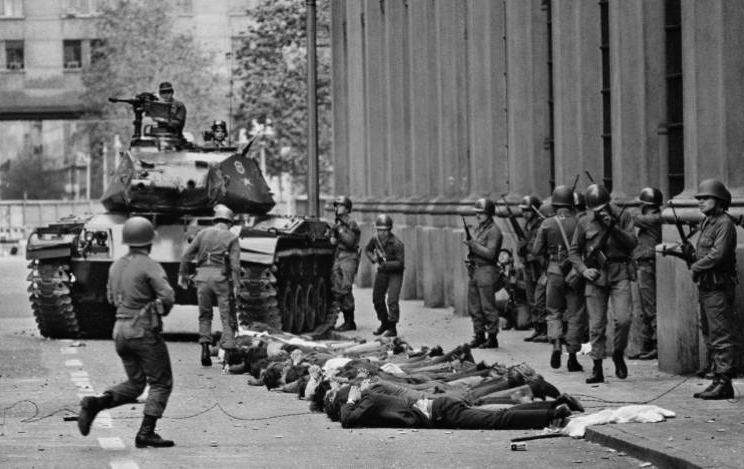For some sectors of the Chilean left, September 11th is the most sacred day, transcending politics to acquire an almost religious dimension. The commemoration of the 1973 coup d’état demonstrates that, more than a simple historical memory, this date represents a genuine liturgy where martyrs and saints of a narrative consolidating a painful vision of Chile’s recent history are honored.
Like all religions, the liturgy of September 11th has its sacred symbols. The victims of the dictatorship’s atrocities hold a place comparable to saints in Christianity: figures embodying the purity of sacrifice and the fight for a just cause. The disappeared, in particular, hold a place of special reverence, as the inability to close the mourning keeps the painful wound of their absence open. And Salvador Allende is the ultimate martyr, whose figure has been sanctified, an indisputable icon of personal sacrifice in defense of an ideal to build a better country. As in religious ceremonies, shared suffering unites the faithful, who gather each year to remember the fallen ones and keep their memory alive.
Priesthood without God or sin
Although this liturgy lacks God at its center, it has leaders who act as priests. The speakers, emblematic figures of the left, guide the community with fervent conviction in a kind of recital where words of hope and struggle rise like prayers. The victory of the “united people,” which “will never be defeated,” so often chanted, is presented as a promised land: always visible, but unreachable, like the horizon. Or the Christian paradise, whose constant promise keeps hope alive.
Unlike traditional religions, this liturgy lacks an essential element: guilt. Monotheistic religions like Christianity, Judaism, and Islam also commemorate tragic disasters and suffering, but in them, the recognition of one’s own sin is fundamental to achieving redemption. In the liturgy of September 11th, however, the sins belong exclusively to the enemy: fascism, imperialism, the political right, and the oppressive military. While self-criticism has emerged in other political contexts, the liturgy of September 11th generally does not reflect on internal mistakes that may have also contributed to the 1973 tragedy.
This void in the narrative is perhaps the most unsettling. Shared pain unites the community, but the lack of reflection on collective responsibility limits the possibilities of overcoming trauma. As someone who has grown up in this environment, I wonder if this omission prevents us all—including those who share many of these ideals—from making an honest examination of our role in history, recognizing that mistakes were not only made by the other side but also by ourselves. Without this reflection, we remain trapped in a cycle of pain and mutual accusation, unable to move toward true national reconciliation, emotional healing, or ethical maturity.
A liturgy in evolution
The liturgy of September 11th is more than just a political commemoration: it is a living cult, evolving with the times but anchored in the same pillars of pain, resistance, and struggle. While it has united generations around a common cause, even of mutual aid in the harsh challenges of exile, the lack of self-criticism could turn it into a stagnant cult.
Comparing September 11, 1973, with the plebiscite of September 4, 2022, reveals how both defeats have been processed and remembered. Both dates represent severe failures for the Chilean left, but the essential difference lies in responsibility. The narrative of the 1973 coup allows the left to avoid deep self-criticism about errors in governance, radicalization, and internal divisions within Allende’s government. The external enemy acts as a shield that diverts attention from any internal responsibility, consolidating the idea of a just struggle crushed by undemocratic power, a narrative that the September 11th cult keeps alive.
In contrast, the defeat in the 2022 plebiscite offers no clear external enemy to blame. It was a democratic decision made by the Chilean people, who clearly rejected a proposed Constitution mainly drafted by progressive and left-wing sectors. Much of the responsibility lies in the political decisions themselves and in the disconnect between the proposal and the expectations of a majority of voters. A historic opportunity to move toward a fairer country was wasted, leaving the neoliberal Constitution imposed under the dictatorship intact.
The weight of error in the collective memory
While September 11th remains a date loaded with symbolism due to its connection with the pain and violence of the coup, the plebiscite of September 4, 2022, is a more recent wound. For now, it is a date ignored by the Chilean left, whose historical significance is still developing. Its relevance will depend on the willingness to recognize that it was a defeat caused largely, though certainly not entirely, by one’s own mistakes, and not by the imposition of an external force over the will of the “people.” On the contrary, it was the people themselves who expressed themselves through a democratic plebiscite. Self-criticism is indispensable for this event not to be just a fleeting political defeat but a moment of learning and renewal.
In the end, the question is whether the September 11th cult can evolve toward an authentic national reflection or whether it will remain a ritual that repeats, year after year, an immutable narrative where the blame always lies with the other. The mistake of the 2022 plebiscite makes it a more difficult defeat, but also an opportunity to embrace a valuable lesson if it is faced with maturity and honesty. Accepting that the people were never united, as demonstrated by the 2022 plebiscite, is a tough but necessary step for political and moral redemption. Societies can sometimes learn to live together even through—and not despite—their differences. They do so without demonization, acknowledging that their own mistakes and shortcomings make them more, not less, human.











